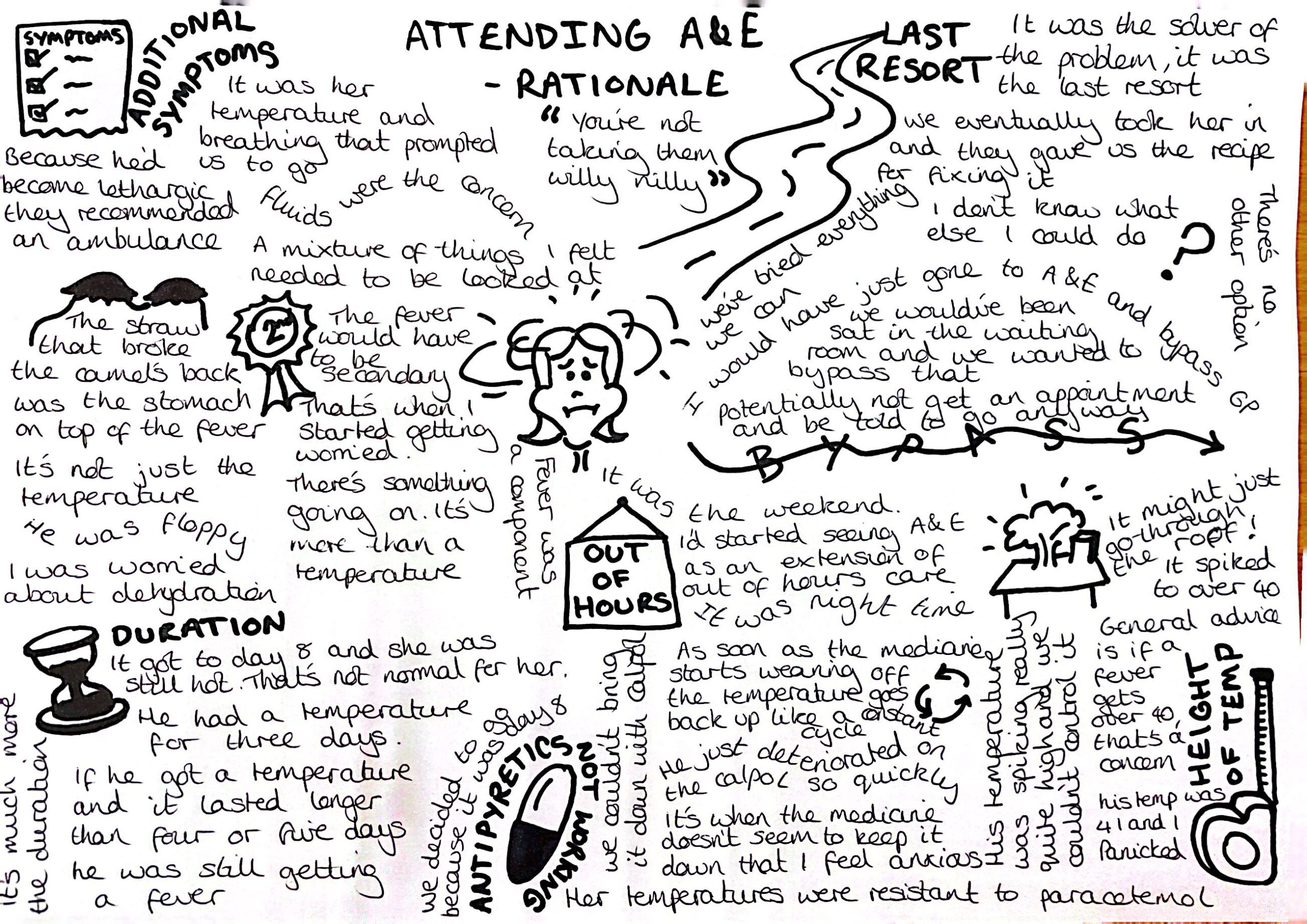Coming in Hot: PhD Student Courtney Franklin’s Research on Understanding Parents’ and Doctors’ Views on Children’s Fevers in Emergency Department

Congratulations to Dr Courtney Franklin on passing her VIVA, funded through the NIHR Applied Research Collaboration North West Coast (ARC NWC) and the School for Public Health Research, has recently published her research titled “Coming in hot: A qualitative investigation into perceptions of parents and doctors of reasons for presentation of children with fever to the Emergency Department in England.”
The study explored how parents and doctors perceive and respond to febrile illness conditions characterised by elevated body temperature indicating fever in children. Using innovative methods like emotional journey mapping, the research captured the experiences of parents as they noticed, managed, and sought care for their child’s fever, while assessing the impact of varying healthcare advice on decision-making and care pathways.
The journey mapping approach involved working closely with parents to document their experiences from noticing their child’s fever to seeking emergency care while highlighting emotional stress points along the way. “Using this method allowed us to uncover not only the practical barriers parents face but also the emotional toll that often shapes their health-seeking behaviour,”Courtney reflected.
Noteworthy findings include the identification of systemic communication barriers between primary and secondary care settings. “Some parents reported feeling confused and stigmatised due to inconsistent advice from General Practitioners and emergency doctors,” Courtney explained. “This misalignment in guidance often facilitated Emergency Department visits, which led to increased stress for parents and unnecessary delays in treatment. The lack of cohesive communication between primary and secondary care remains a significant barrier.”
“Courtney’s use of the journey maps was innovative providing her with context and insight into the complexity of parent decision-making in relation to febrile illness” said one of Courtney’s supervisors Professor Bernie Carter of Edge Hill University.
Central to Courtney’s research was the use of the ARC NWC Health Inequalities Assessment Toolkit (HIAT), this was important at the outset and throughout her studentship to ensure an equity-focused perspective on her work. “The HIAT was invaluable in embedding a health inequalities lens across all stages of the research,” Courtney shared. “It facilitated the involvement of a public advisor, who provided crucial insights into accessible design for participant-facing documents and contributed unique perspectives to the analysis of qualitative data.”
Collaboration with a public advisor was a standout feature of Courtney’s research. ARC NWC Public advisor Paul Moran played an integral role, initially supporting study design and later contributing to data analysis. “Working with Paul was transformative,” Courtney noted. “His lived experience as a parent added depth and ensured that our findings were grounded in real-world concerns.”. Further opportunities to discuss this work at Public Advisor Forums allowed for further insight.
Looking ahead, Courtney is passionate about ensuring her findings lead to meaningful change. “Publications are a starting point, but I want to see this work make a tangible difference,” she said. She envisions creative dissemination strategies, such as animations or videos shared in GP surgeries and emergency departments, to better support parents. “It’s vital to find ways that truly resonate with families, whether through digital tools or visual resources that offer emotional reassurance and practical advice.”
Reflecting on her time with ARC NWC, Courtney expressed gratitude for the collaborative environment and support she received. “The infrastructure and connections provided by ARC NWC have been instrumental in shaping my research,” she said. “From access to public advisors to tools like the HIAT, I’ve been able to approach my work in ways that emphasise inclusivity and real-world impact.”
Courtney’s journey highlights the importance of co-production, innovative methodologies, and a commitment to addressing health inequalities. As she prepares for the next chapter of her career, her research serves as a powerful example of how equity-focused work can bridge gaps in healthcare and create lasting change for underserved communities.
Courtney has now published 2 papers from her PhD study which can be found here:
Franklin C, Mason K, Akanni L, Daras K, Rose T, Carter B, et al. Neighbourhood socioeconomic conditions and emergency admissions for ambulatory care sensitive conditions in children: a longitudinal ecological analysis in England, 2012-2017. BMJ paediatrics open [Internet]. 2025;9(1):e002991. Available from: https://pubmed.ncbi.nlm.nih.gov/39832827/
Franklin C, Taylor-Robinson D, Carrol ED, Moran P, Carter B. Coming in hot: a qualitative investigation into perceptions of parents and doctors of reasons for the presentation of children with fever to the emergency department in England. BMJ Paediatrics Open [Internet]. 2024 Dec 1;8(1):e003039–9. Available from: https://pmc.ncbi.nlm.nih.gov/articles/PMC11683883/
You can contact Courtney about her research by contacting her on: Courtney.franklin@liverpool.ac.uk